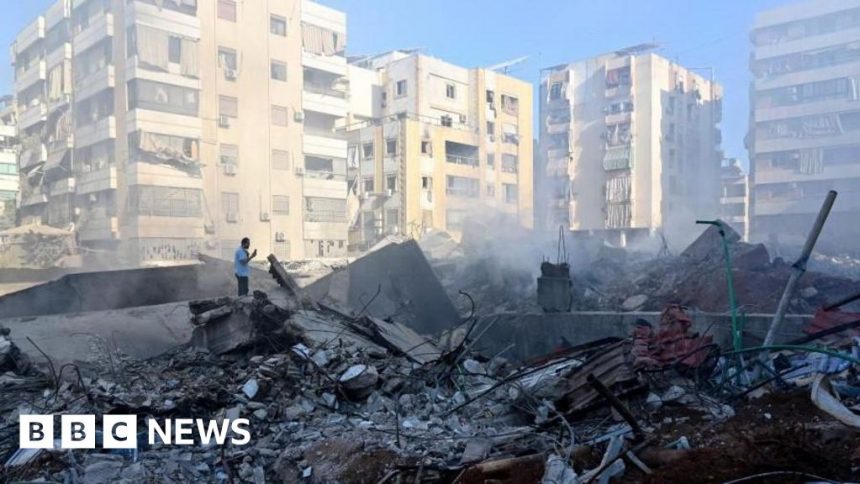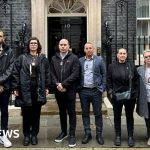What to know about the Israel-Hezbollah conflict
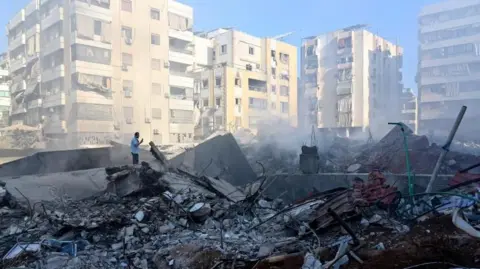 EPA
EPAIsrael and Hezbollah appear to be spiralling towards an all-out war that could spread to the wider region, after a week of significant escalation in their long-running conflict.
On Friday, Israel dealt a devastating blow against Hezbollah by killing the Shia Islamist group’s leader Hassan Nasrallah in a huge air strike in Beirut’s southern suburbs.
It came amid an ongoing air campaign that the Israeli military says is targeting infrastructure built up by Hezbollah across Lebanon since their last war in 2006, which is paving the way for a possible major ground operation.
Israel has gone on the offensive after almost a year of cross-border hostilities sparked by the war in Gaza, saying it wants to ensure the safe return of residents of border areas who have been displaced by Hezbollah attacks.
Although Hezbollah has been weakened, it has not been defeated. The group is continuing to fire barrages of rockets into northern Israel and is still believed to possess a formidable arsenal of long-range missiles.
Here’s a brief guide to the many developments which have unfolded in recent days.
Hezbollah reels from Nasrallah killing as Israel says it is ‘winning’
Israel has notified the US that it intends to launch a limited ground incursion into Lebanon imminently, the BBC’s US partner CBS cites a US official as saying.
BBC world affairs correspondent Paul Adams says Israeli tanks have been massing close to the Lebanese border, reservists have been called up, though in small numbers, and Israel’s top general told troops last week to prepare to operate inside Hezbollah strongholds.
The head of the military’s Northern Command is said to favour the creation of a buffer zone inside southern Lebanon, to clear Hezbollah fighters and infrastructure away from the border, and allow Israel to return 60,000 civilians to homes evacuated almost a year ago.
US media reported earlier that small teams of Israeli commandos had been mounting brief raids across the border.
But so far there are no signs of Israeli armour crossing the border.
An Israeli ground operation in Lebanon is looming
Israel has inflicted huge damage on Hezbollah in recent weeks, killing more than a dozen top commanders and apparently destroying thousands of weapons in air strikes. It was also blamed for the exploding pager and walkie-talkie attacks that left thousands of Hezbollah members maimed, blinded or killed. However, BBC International Editor Jeremy Bowen says the killing of Hassan Nasrallah is the biggest blow of all.
For more than 30 years, he was the beating heart of Hezbollah. With the help of Iranian funding, training and weapons, he turned it into a military force whose attacks led Israel to end a 22-year occupation of southern Lebanon in 2000 and which fought Israel to a standstill during a month-long war in 2006.
For Israel, Nasrallah’s killing is a huge victory. In a defiant speech at the UN on Friday, Israeli Prime Minister Benjamin Netanyahu asserted that Israel was “winning” the war against enemies who wanted to destroy it. By then, he had authorised the strike that killed Nasrallah.
Bowen: West left powerless as Israel claims its biggest victory yet against Hezbollah
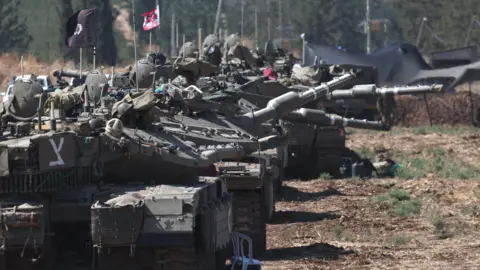 EPA
EPALebanon says hundreds have been killed and up to a million displaced
The Lebanese health ministry said on Saturday that Israeli attacks had killed more than 1,000 people in the previous two weeks, including 87 children and 56 women.
There was no let-up in the Israeli bombardment on Sunday, as another 100 people were killed and Prime Minister Najib Mikati warned that as many as one million people – a fifth of the population – might have fled their homes.
Authorities are struggling to assist everyone, with shelters and hospitals under pressure.
Israel says it is hitting Hezbollah sites, including weapons stores and ammunition dumps, and accused the group of using civilians as human shields.
But BBC senior international correspondent Orla Guerin says that is disputed by residents of the central Bekaa Valley, a Hezbollah stronghold that has been bombed repeatedly in the past week.
The medical director of the local Rayaq hospital also told her that all of the casualties it had treated had been civilians.
Young Lebanese girl left fighting for life after Israeli strikes
‘I grabbed my grandchildren and ran’: Lebanon families flee Israeli strikes
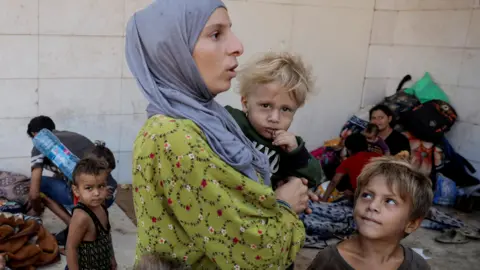 Reuters
ReutersEfforts to de-escalate the conflict have failed
US President Joe Biden welcomed Hassan Nasrallah’s killing. However, BBC state department correspondent Tom Bateman says the Israeli decision to escalate sharply the conflict with Hezbollah struck a potentially fatal blow to his entire strategy of the last 11 months – to try to stop the war in Gaza engulfing the region.
Mr Biden has said he is boosting the US defensive posture in the Middle East, while the Pentagon has warned Iran-backed militias not to try to use this moment to attack US bases.
Despite the earlier US attempts to rein in the Israeli leader and coax Hezbollah to a truce, Mr Netanyahu has signalled strongly that he will act as he sees fit, whatever the pressure from Washington.
Can diplomacy bring Middle East ceasefire? Early signs don’t bode well
Hezbollah and Iran are considering how to respond
In a speech on Monday, Hezbollah’s deputy leader, Naim Qassam, described its current rocket, drone and missile attacks on Israel as “the bare minimum” and said it would “emerge victorious” if Israeli forces decided to launch a ground offensive.
The group still has thousands of fighters, many of them veterans of combat in neighbouring Syria’s civil war, as well as a substantial arsenal of missiles, many of them long-range, precision-guided missiles that could reach Tel Aviv and other cities.
BBC Security Correspondent Frank Gardner says there will be pressure within its ranks to use those missiles before they get destroyed, but that a mass attack on Israel that kills civilians could trigger a devastating response.
The assassination of Nasrallah was also a huge blow to Iran, hitting at the heart of the regional network of allied, heavily armed militias known as the “Axis of Resistance” that is key to its deterrent strategy against Israel.
On Sunday, Israeli jets struck infrastructure in Yemen’s Red Sea port city of Hudaydah in response to recent missile and drone attacks by the Iran-backed Houthi movement.
Iran could ask the Houthis and other groups to step up their attacks on both Israel and US bases in the region. But whatever response it chooses, it will likely calibrate it to be just short of triggering a regional war that would draw in the US and which it could not win.




